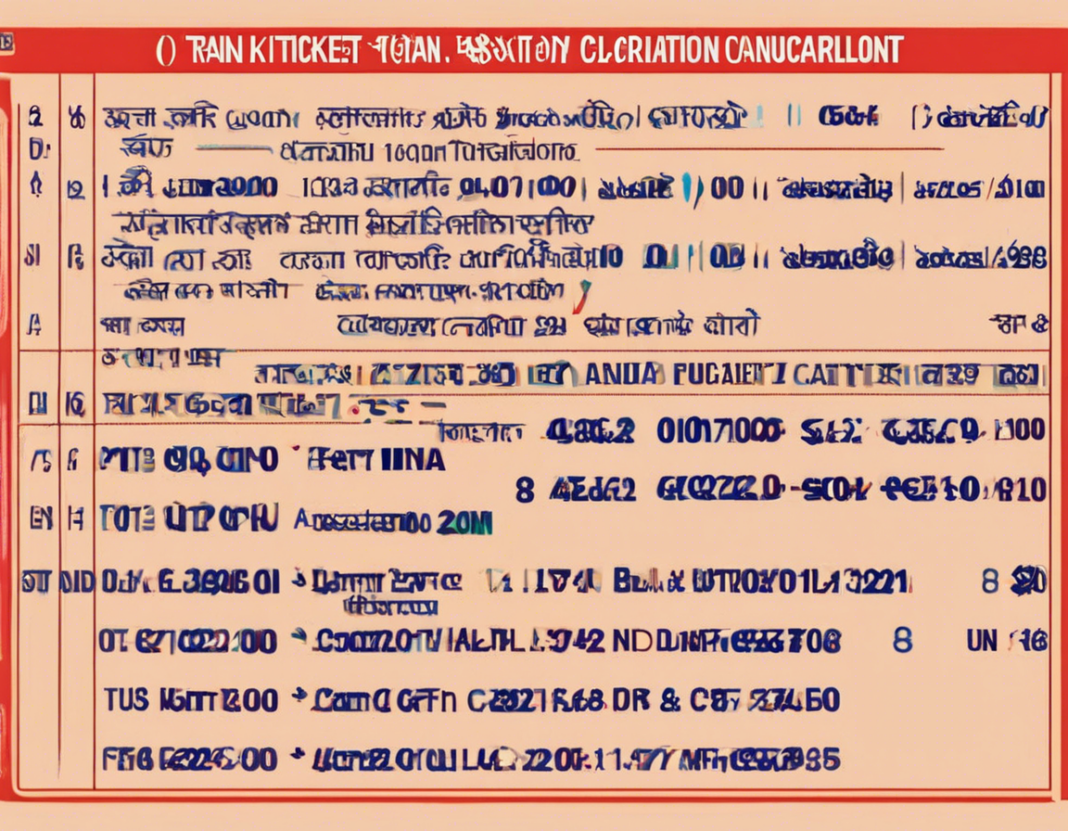Train travel can be an exciting and convenient way to reach your destination. However, sometimes plans change, and you might find yourself needing to cancel your train ticket. Train ticket cancellation charges are a common concern for many passengers, as they can vary depending on the type of ticket, the time of cancellation, and the railway company’s policies. In this comprehensive guide, we will explore everything you need to know about train ticket cancellation charges, including how they are calculated, tips to minimize them, and common FAQs to help you navigate this process more efficiently.
Understanding Train Ticket Cancellation Charges
When you purchase a train ticket, you enter into a contract with the railway company. This contract outlines the terms and conditions regarding ticket cancellations and refunds. Train ticket cancellation charges are fees that may apply when you decide to cancel your ticket. These charges are usually deducted from the refund amount you are eligible to receive.
Factors Affecting Cancellation Charges
Several factors can influence the cancellation charges you might incur when canceling a train ticket:
1. Type of Ticket:
- Sleeper/General Class: These tickets typically have lower cancellation charges compared to AC class tickets.
- Tatkal/Express Tickets: Special fare tickets like Tatkal or Premium Tatkal often have higher cancellation charges.
2. Time of Cancellation:
- Early Cancellation: Cancellation made well in advance before the departure time may incur lower charges.
- Last-Minute Cancellation: Cancellation close to the departure time can lead to higher charges or no refund at all.
3. Railway Company Policies:
- Each railway company has its own set of rules regarding cancellation charges. It is important to familiarize yourself with these policies when booking your ticket.
4. Online vs. Offline Booking:
- Cancellation charges can vary between tickets booked online and those purchased at the station counter. Online tickets may have different cancellation fee structures.
Calculating Cancellation Charges
The calculation of cancellation charges is typically based on a percentage of the total ticket fare. For example, if you cancel your ticket well in advance, you might receive a refund after deducting a nominal cancellation fee. However, for last-minute cancellations or special fare tickets, the charges can be higher, sometimes resulting in no refund.
Tips to Minimize Cancellation Charges
While cancellation charges are often unavoidable, there are some strategies you can use to minimize the impact on your wallet:
1. Opt for Refundable Tickets:
- When possible, choose refundable tickets that offer more flexibility in case your plans change.
2. Cancel Early:
- Try to cancel your ticket as soon as you know your plans have changed to avoid higher charges.
3. Check the Policies:
- Familiarize yourself with the cancellation policies of the railway company before booking your ticket to understand the potential charges.
4. Consider Travel Insurance:
- Travel insurance can sometimes cover cancellation fees in certain situations, providing an added layer of protection.
Frequently Asked Questions (FAQs)
1. Can I cancel my train ticket and get a full refund?
- Answer: Full refunds are often available for tickets canceled well in advance, minus a nominal cancellation fee.
2. What happens if I cancel a ticket at the last minute?
- Answer: Last-minute cancellations can result in higher charges or no refund, depending on the railway company’s policies.
3. Are cancellation charges different for online and offline bookings?
- Answer: Yes, cancellation charges can vary based on how and where you purchased the ticket.
4. Can I transfer my ticket to someone else instead of canceling it?
- Answer: Some railway companies allow ticket transfers with a nominal fee, but this option may not be available for all ticket types.
5. How can I avoid cancellation charges altogether?
- Answer: Opt for refundable tickets, cancel early, and thoroughly understand the cancellation policies to minimize or avoid charges.
6. Are there any exemptions to cancellation charges in case of emergencies?
- Answer: Some railway companies may offer waivers or refunds in case of documented emergencies, but these cases are typically evaluated on an individual basis.
7. Can cancellation charges be waived if the train itself is delayed or canceled?
- Answer: In some instances, if the train is significantly delayed or canceled, you may be eligible for a refund without additional charges.
8. Do senior citizens or military personnel receive any discounts on cancellation charges?
- Answer: Some railway companies offer special concessions on cancellation charges for senior citizens, students, and military personnel. It is advisable to check the specific policies.
9. Can I partially cancel a round-trip ticket and still receive a refund?
- Answer: Depending on the railway company’s policies, partial cancellations of round-trip tickets may be allowed with adjusted refund amounts.
10. How soon can I expect to receive my refund after canceling a ticket?
- Answer: Refund processing times vary but typically range from a few days to a few weeks, depending on the payment method and the railway company’s procedures.
In conclusion, understanding train ticket cancellation charges and how they are calculated is essential for any train traveler. By familiarizing yourself with the factors that influence these charges, exploring strategies to minimize them, and being aware of common FAQs, you can navigate the ticket cancellation process with confidence and make informed decisions when managing your travel plans. Remember to always check the specific policies of the railway company you are booking with to ensure a smooth and hassle-free cancellation experience.
